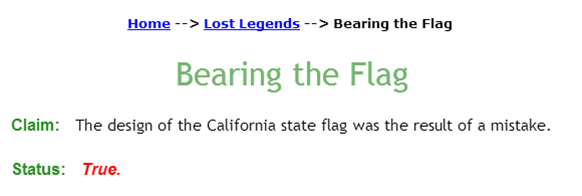Nopes
The story in the paragraph below is false. Fiction. Urban legend. Made up — just not by me.
In 1848, California and Mexico were at war. A group of Californian settlers managed to hold their ground against a larger, better armed band of Mexican attackers, and went to hoist the flag of California above their successfully defended fort. Unfortunately, none had been created yet. The captain, Jebidiah Bartlett (whom the lead character in The West Wing is named for), forcefully made a suggestion. He wanted to pay homage to the area’s rich agricultural givings, specifically to the pear industry. (It may have had something to do with the fact that Bartlett had helped create the pear variety of the same name and was a titan of local ag industry.) The group sent instructions to a local painter to put together a flag featuring a pear in the center. Unfortunately, the painter misread the instructions, and painted a bear instead. The flag of California has looked like this –one bear, no pears — ever since.
Again, that story is complete nonsense (except that the flag of California does in fact look like this). Like many tall tales, that story has been emailed around by unsuspecting victims of the ruse for years. And like many urban legends, the Internet’s foremost debunker of myths, Snopes.com, has an entry about it.
Except this time, it’s different. Snopes claims the story is true.
Snopes, officially titled “the Urban Legends Reference Pages,” was founded in 1995 by Barbara and David Mikkleson, a California couple with an interest in folklore who were early users of Internet newsgroups. With millions of visitors each month, their websites have become the go-to place to find out if that shocking story (or virus warning) which just hit your email inbox is, indeed, true. And in general, their information is reliable — it has to be, otherwise it wouldn’t be worth much as the reference it strives to be.
But they also want to drive their mission home. Snopes is predicated on the idea that what one reads online should be taken with a grain of salt. (Although, to be fair, that’s true offline, too.) That rule of thumb, they believe, applies to them as well — “common sense dictates that you should never fully rely upon someone else to do the fact checking for you,” one page reads. So they concocted a section called “The Repository of Lost Legends” (“TROLL”), consisting of nine stories made up by the Snopes duo, five of which they flagged as “True.” Here is the “pear flag” story, and there is also one about how Mississippi removed fractions and decimals from the school curriculum, and three other stories which are just believable enough — but are fake. Clicking the “additional information” link at the bottom of the page takes the reader to this one, which explains the ruse and its purpose.
Unfortunately, not everyone knows about Snopes’ intentionally false articles. One victim, directly or otherwise, was a television show titled Mostly True Stories: Urban Legends Revealed, which aired on TLC in the United States from 2002 to 2004. In one episode, according to Wikipedia, the show declared that the nursery rhyme “Sing a Song of Sixpence” was actually a coded pirate recruitment song. That urban legend, which TLC declared to be true, is one of the five fake “trues” in Snopes’ Repository of Lost Legends — and, like the pear flag story, is complete fiction.
Bonus fact: If you read the Snopes article about the Flag of California, it says that the man who created the Bear Flag (by drawing the bear) was William Todd, who happened to be the nephew of Abraham Lincoln’s wife, Mary Todd Lincoln. That part is true, according to the “Great Bear Almanac” written in 1996. Ostensibly, William Todd was a painter, but the “Great Bear Almanac” did not think too highly of his work. The book states that “Todd was a poor artist and the bear better resembled a pig.” The book’s judgment is probably right.
From the Archives: The First American Flag Was Very British Looking: 100% true. 0% pears. 0% bears, too.
Related: “Encyclopedia of Urban Legends” by Jan Harold Brunvand. 4.2 stars on 11 reviews.

